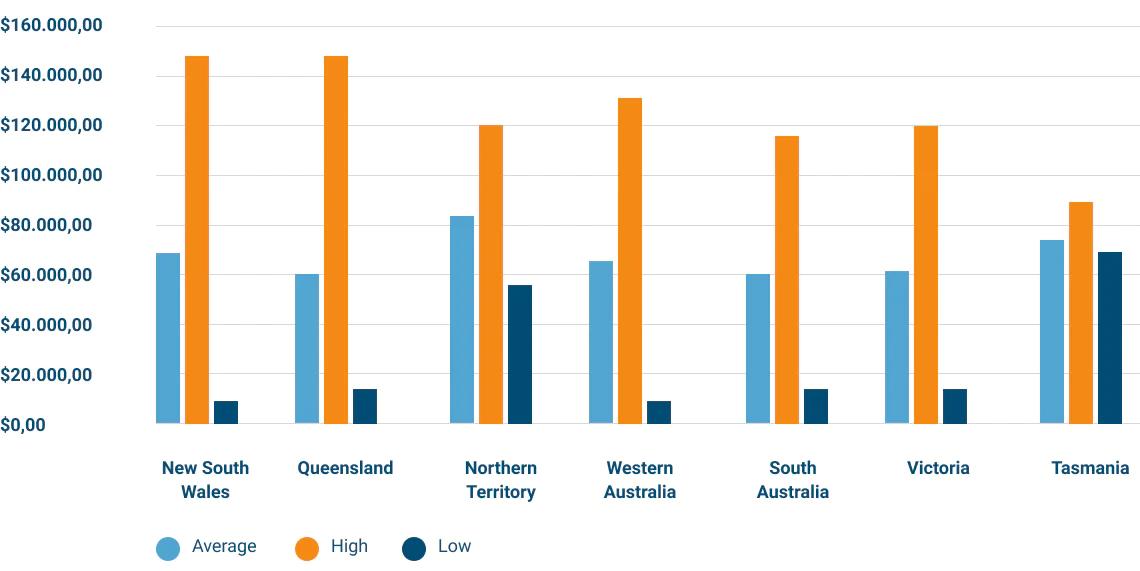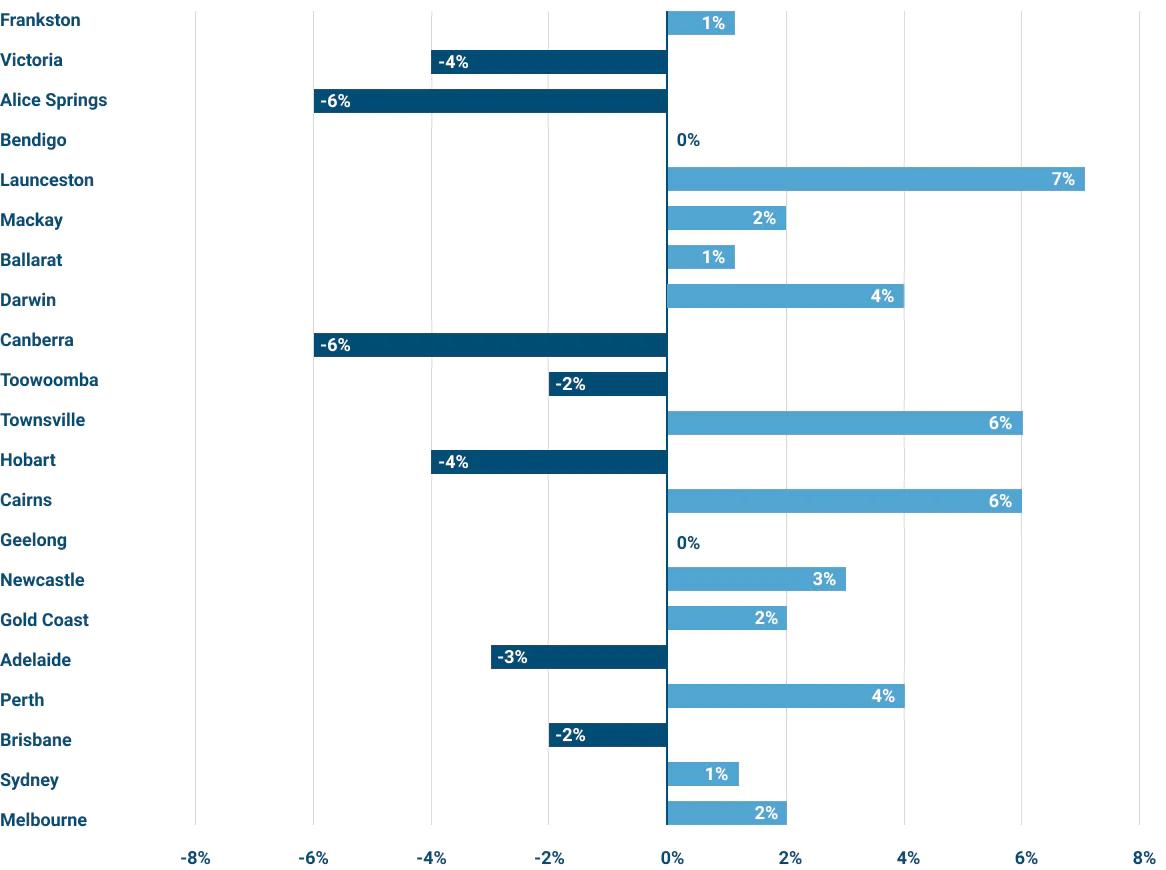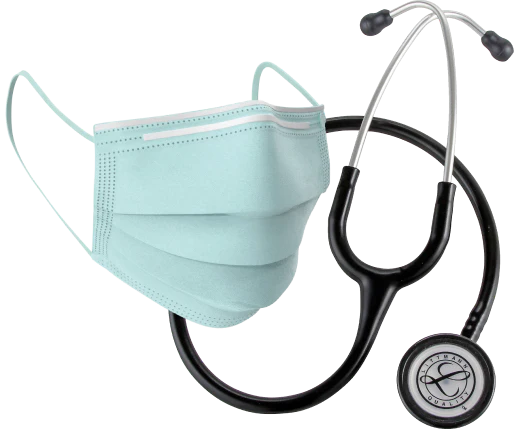Nurse Salary Guide 2025
What Do Nurses Earn in Australia?

Introduction
While it might be fair to say that nurses are always underpaid considering the demands of the job, Australia is among the highest paying countries in the world, regularly appearing in the top ten for average salary paid. Of course, much depends on the type of nursing jobs you train and qualify for, and while the starting salary for a junior nurse may be relatively low, Australia offers a broad scope for professional development that can see a nurse’s salary rise significantly.
But what kind of salary can a Registered Nurse expect in Australia and what kind of opportunities exist to maximise your pay? Here, we look into what nurses earn in Australia, where you’ll get the best pay and opportunities for professional development, and what kind of standard of living you can expect if you decide to take up nursing as a vocation. Read on to learn more.
01.
Nurse’s Salary Average by Experience – Global Overview
In the table below, we have compiled the average hourly salary for nurses in some of the world’s most developed nations broken down by experience level, and then by average across all experience levels for Registered Nurses.
| Australia | New-Zealand | U.S. | Canada | U.K | Germany | |
| Entry Level | AU $31.39 | AU $25.21 | AU $44.38 | AU $37.35 | AU $26.77 | AU $24.50 |
| Early Career | AU $33.87 | AU $28.11 | AU $47.06 | AU $38.48 | AU $28.36 | AU $28.61 |
| Mid-Career | AU $39.69 | AU $31.35 | AU $51.78 | AU $42.02 | AU $31.30 | AU $34.23 |
| Late Career | AU $40.49 | AU $33.22 | AU $55.83 | AU $46.77 | AU $33.48 | N/A |
| Experienced | AU $40.64 | AU $33.36 | AU $58.61 | AU $47.78 | AU $33.69 | N/A |
| Average Hourly Pay | AU $35.28 | AU $29.94 | AU $50.27 | AU $39.62 | AU $31.30 | AU $26.93 |
UK Source Link: https://www.payscale.com/research/UK/Job=Registered_Nurse_(RN)/Salary
Germany Source Link: https://www.payscale.com/research/DE/Job=Registered_Nurse_(RN)/Salary
Currency Convertor Link: https://xe.com

02.
Nurse’s Salary in Australia – A Breakdown
The average hourly pay for Registered Nurses in Australia is among the best in the world, comparing favourably with other nations that boast exceptional healthcare systems. Australian nurses are paid pretty similarly whether they work in the private or public sector. This translates to an average salary of around $64,000 per year for an RN; however, this figure will differ slightly depending on the state in which you are employed.
The below figures represent the average, high, and low salaries for each state. It should be noted that these figures include trainee nursing salaries and executive salaries at the low and high end respectively, so these numbers are not adjusted for years of experience.
RN Salaries By State

https://salary.calculatorsaustralia.com.au/nurse-salary-australia
An example from this chart shows that in South Australia, the highest salary for nurses is just around $115,000, the lowest salary is around $12,000, and the average is about $59,874. Those figures are about average with much of the rest of the country.
Additionally, within each state, you may find different wage structures associated with the city or town you work in. The chart below represents the deviance from the national average wage by percentage in Australia’s most populous cities.
Percentage Difference of National Average Salary
Here, you’ll notice that major cities like Victoria and Brisbane trend lower than the national average, while others like Sydney and Melbourne trend higher. These figures may factor into your decision about where to seek employment as a nurse.

https://www.payscale.com/research/AU/Job=Registered_Nurse_(RN)/Hourly_Rate
03.
What Type of Nurses Get Paid the Most?
We know that there is a big difference between what an assistant in nursing is paid as compared to nurses who work at a higher level, but what do those differences look like? These loose figures represent a broad range of different nursing professions and experience levels.
The Fairwork Ombudsman includes the following guides for pay across the spectrum, including Nursing Assistant salaries, Enrolled Nurse salaries, and Registered Nurse salaries. We find that this breakdown provides great insight into what kind of pay you can expect at each stage of your nursing career.
| Classification | Hourly | Weekly |
| Nursing Assistant 1st Year | $24.58 | $934.20 |
| Nursing Assistant 3rd Year | $25.37 | $964.00 |
| Enrolled Nurse ay Point 1 | $26.67 | $1,013.40 |
| Enrolled Nurse Pay Point 5 | $28.06 | $1,066.10 |
| Registered Nurse Level 1, Pay Point 1 | $28.53 | $1,084.10 |
| Registered Nurse Level 5, Grade 6 | $63.33 | $2,406.60 |
| Occupational Health Nurse - Level 1, Pay Point 1 | $30.62 | $1,163.70 |
| Occupational Health Nurse - Level 3, Pay Point 4 | $40.24 | $1,529.30 |
Additionally, this pay guide from The Fairwork Ombudsman does not include salaries within nursing professions that go beyond Registered Nurse. These job roles may include Clinical Nurses, Consultant Nurses, Nurse Specialists, Practice Nurses, and other executive or directorial roles within hospitals and care facilities or organizations.
It is fair to say that if you wish to progress past the Registered Nurse role, you can expect to be paid much higher salaries than any other type of nurse. For example, our research shows that the hourly rate of a Nursing Practitioners' salary is more than three times that of an entry-level Registered Nurse and still significantly more than a top-level Registered Nurse.
Salaries for these positions are generally calculated in proportion to the type and size of responsibilities involved in any given position, along with its location and associated facility. To give you some idea of the types of salaries these types of professionals may earn, we have listed some of the entry-level rates of those positions as quoted on the Queensland Health portal.
| Classification | Hourly | Annual |
| Clinical Nurse or Midwife | $52.86 | $104,816 |
| Nurse Practitioner | $73.08 | $144,913 |
| Director of Nursing | $94.00 | $186,382 |
| Executive Director of Nursing | $122.33 | $242,573 |
Salaries for Other Nursing Roles
We know that with such a broad range of roles available to nurses, it will come as no surprise that increasingly specialised skills and experience attract the best wages and benefits. In fact, specialised roles account for some of the highest salaries in Australia, with a range of highly skilled nursing roles in various sectors of the healthcare industry. Currently, the highest paying roles for nurses include:
| Role | Approximate Annual Salary |
| Certified Registered Nurse Anaesthetist | $78k to $205k |
| Nurse Researcher | $98k to $125k |
| Mental Health Nurse Practitioner | $128k to $146k |
| Geriatric Nurse | $80k to $126k |
| Paediatric Nurse | $80k to $124k |
| Orthopaedic Nurse | Up to $103k |
| Neonatal Nurses | $80k to $83k |
| Pain Management Nurse | Up to $180k |
| Family Nurse Practitioner | $75k to $90k |
| Gerontological Nurse Practitioner | $129k to $147k |
| Nurse Educator | $67k to $115k |
| Informatics Nurse | $111k to $136k |
| Critical Care Nurse | $80k to $123k |
| Health Policy Nurse | Up to $135k |

04.
Do Nurses Get Paid Salary or Hourly?
In Australia, how you are paid is dependent on the policy of the facility in which you work as well as your position. This can be calculated as an hourly rate or as an annual salary that is paid weekly, bi-weekly, or even monthly. Additionally, depending on where you work, you might be paid on a different day of the week or month.
From what we’ve seen, there’s no hard and fast rule for what day of the week you might be paid. The bottom line is that it is your employer who will decide how and when you are paid, so be prepared to factor that into your planning when you embark on your nursing career.
05.
How Many Days Do Registered Nurses Work?
The working hours of Australian nurses can vary significantly, and in truth, there is almost always overtime available to nurses due to the demands of the Australian healthcare system. Overtime wages would be paid in addition to your base salary. However, as an average baseline, Registered Nurses will work something similar to that of the average Australian—38 hours per week. This may change as you advance your career and begin to specialise, but you should account for this type of working week across your career as a whole.
When you begin your nursing career, working hours may be split across 12-hour shifts over three consecutive days, giving you a 36-hour working week. Again, however, you may be expected to contribute overtime if the job demands, and so this may mean longer hours split across weekends and holidays. Additionally, it is rare that a Registered Nurse’s hours will be confined to the average 9-5, so you may find your working week is very different to that of those outside the industry.
06.
What Do Part Time Nurses Get Paid in Australia?
Part-time nurses can expect to earn a similar hourly rate as their full-time counterparts, but of course the total annual salary will be tied directly to the number of hours worked within the year. Part-time Registered Nurses often work between 24 and 32 hours per week. In our experience, the number of hours that you might work as a part-time nurse will be negotiable between you and your employer.
Working as a part-time nurse offers numerous advantages. These can include increased flexibility in your working hours, as well as being able to define your working hours more clearly if you have other responsibilities, such as child or elder care, for example. Additionally, as is true for full-time Registered Nurses, there is almost always the opportunity to take on additional hours when your hospital or healthcare facility is under pressure—or simply needs to fill the spot of someone on vacation.
07.
Can You Live Off a Nurse’s Salary?
The short answer is, of course, yes! We won’t lie to you, though: at the beginning of your career, things may be a little tight. Depending on how you enter the healthcare industry, the cost of living may be on par with your salary. But the good news is that Registered Nurses and above can expect to live relatively comfortably anywhere in Australia.
It’s no secret that the costs of living in Australia are high, and according to data we found, the average weekly spend for Australians is as follows:
| Single Person - Under 35 | Couple - At least one under 35 | Couple with Children - Youngest Under 5 | Couple with Children - Youngest between 5-14 | Couple with Children - Youngest 15 and older | |
| Housing | $284 | $381 | $458 | $355 | $359 |
| Fuel & Power | $24 | $35 | $48 | $54 | $53 |
| Food & Drink | $122 | $239 | $282 | $336 | $332 |
| Clothing & Footwear | $18 | $54 | $62 | $64 | $61 |
| Medical Expenses | $23 | $69 | $85 | $104 | $110 |
| Alcohol | $22 | $39 | $28 | $35 | $47 |
| Transport | $97 | $243 | $247 | $309 | $292 |
| Recreation | $83 | $176 | $158 | $263 | $243 |
| TOTAL | $673 | $1,236 | $1,368 | $1,520 | $1,497 |
| With Other Expenses (household furnishings and equipment, household services, and operation, personal care, miscellaneous goods and services and tobacco products) | $849 | $1,572 | $1,833 | $2,085 | $1,990 |
https://moneysmart.gov.au/australian-spending-habits
As we have previously detailed, an entry-level Registered Nurse can expect to earn around $1084.10 per week, which is enough for a single person to easily cover living costs and leave a little leftover for savings. Obviously, as you progress through your career, things will become more comfortable.

08.
What Can Registered Nurses Claim on Tax for Expenses?
We have more good news relating to nursing salaries, and that is that it may be possible to claim a number of deductions relating to Australian taxes in your profession. In fact, the Australian Taxation Office notes that nurses may be able to claim a broad range of work-related expenses. These may include but are not necessarily limited to:
- Agency commissions and agency fees
- Annual practising certificate fees
- Car expenses
- Childcare
- Driver's licence
- Entertainment and social functions
- Fines and penalties
- First Aid Kits & Courses
- FOB & Nursing Watches
- Glasses, contact lenses and anti-glare glasses
- Grooming expenses
- Home office expenses
- Laundry and maintenance
- Meal and snack expenses
- Newspapers and other news services, magazines and professional publications
- Nursing Scrubs and Uniforms
- Overtime meal expenses
- Parking fees and tolls
- Phone, data and internet expenses
- Removal and relocation expenses
- Repairs to tools and equipment
- Self-education and study expenses
- Seminars, conferences and training courses
- Stationery
- Stethoscopes & Equipment
- Taxi, ride-share, public transport and car hire
- Travel expenses
- Union and professional association fees
However, what you can and can’t claim for as a nurse will depend on a number of factors. Firstly it must be you that pays out the money (without reimbursement), secondly expenses must relate to earning your income, and thirdly you must keep records to prove all of this—usually a receipt or invoice.
We recommend using the myDeductions tool on the ATO website to keep track of work expenses, or you can hire an accountant to help you compile a comprehensive tax return. Either way, a nurse’s salary can receive a significant boost through tax deductions, particularly when you are at the lower pay scales as a student or trainee nurse.
09.
How Can I Become a Student Nurse?
If you wish to study to become a Registered Nurse in Australia, then the first thing you will need is to graduate from high school with the HSC or a state-based equivalent. Next, you will need to study a Bachelor of Nursing at an accredited university. At this point, however, it’s worth noting that some universities will require you to have completed prerequisite subjects at high school, such as science or maths, meaning it’s a good idea to plan your route into the nursing profession while at school.
There is a variety of different Bachelor of Nursing degrees available from universities across Australia, usually requiring at least three years of study and a requisite number of hours of real-world clinical experience. After you have completed your studies, you will need to complete your application to the Nursing and Midwifery Board of Australia (NMBA). This is the professional body that grants you the certification to practice as a nurse.
For students wishing to study nursing in Australia, there are grants, scholarships and other awards available that can help you pursue your healthcare education goals. To register your interest in this type of financial assistance, you should consult the Australian College of Nursing website or speak to counsellor at your school about your potential eligibility.
10.
Can Overseas Nurses Work in Australia?
There are plenty of opportunities for nurses to earn Australian salaries if they have qualified as a nurse abroad. Both proving your identity and meeting minimum English language requirements are the first steps you must take, but the good news for anyone who has qualified as a nurse in certain countries is that your degree will meet the Australian Nursing and Midwifery (NMBA) education standards. These countries are:
- Canada
- Hong Kong
- Republic of Ireland
- United Kingdom
- New Zealand
- United States of America
You will also need to meet certain visa requirements and register with the NMBA. You can find more information about the entire process and the requirements for eligibility on the NMBA’s Ahpra platform here.

11.
What About the Impact of Coronavirus on the Nursing Profession?
For both existing professionals and students, we know that the unprecedented impact of the Coronavirus on all our lives has meant big changes within the industry. Nurses on the frontline, of course, are most directly affected, with the global community relying on their professionalism, knowledge, and experience as never before.
Today, nurses may be required to work increased hours in riskier environments, with global issues relating to PPE shortages and the rise in COVID-19 variants significant factors within today’s hospitals and healthcare facilities. Additionally, the increased pressure on healthcare providers - especially nurses - at all stages of their careers has the potential to significantly affect mental health, leading to job burnout on a grand scale.
The Nursing and Midwifery Board of Australia has published guidance and resources on its website, helping nurses meet the high professional standards of the Australian healthcare system while looking after their own health at the same time. Additionally, the Nursing CPD Institute encourages any nurses to continue their professional development through their online education platform despite any real-world restrictions that may be in place.
For students, a move to online learning has also represented a significant challenge, both to remaining engaged with study and learning the critical on-the-job skills required within the nursing profession. In Australia, conventional lectures are currently held online, with a significant reduction in face-to-face teaching. This has meant increased interactive and self-directed learning for nursing students.
However, while this means less in-person teaching, it represents an opportunity for student nurses and educational establishments to adapt, with necessity the mother of invention. Today, all types of online study sessions, practical workshops, interactive whiteboards and other technologies are contributing to a new way to study—one that may remain, in part, after the pandemic has ended.
12.
What Does the Future of the Nursing Profession Look Like in Australia?
The bottom line is, there will always be a need for dedicated, professional nurses in Australia. However, it is likely that demand will outstrip supply when it comes to labour, with predictions suggesting a shortfall of 85,000 staff by 2025. This is, in part, due to rising populations and ageing demographics, with people living longer lives and requiring higher levels of healthcare as they age.
Today, in a comprehensive workforce modelling report, the Australian Government and healthcare system hopes to reduce this shortfall to approximately 35,000 by 2025 through a range of measures. It is hoped, that as demands increase more nurses can be encouraged to take up the profession at the beginning of their careers, more nurses can be retrained in areas of particularly high demand, and more student and fully trained nurses can be brought into the Australian healthcare system from abroad.
Whatever the direction the Australian government takes, for anyone looking to get started within the industry or retrain as a Registered Nurse, job security is a highly important consideration. Thankfully, with demand constantly rising and calls for nurses and other medical professionals to receive higher salaries, the nursing profession will always be a reliable option for anyone with an interest in healthcare.

More than 15,000 Nursing Supplies in Stock!
Shop nowNurse Salary Guide 2025 – What Do Nurses Earn in Australia?
Discover the average salary of a Registered Nurse in Australia and learn how you can train to work within the healthcare industry.
By submitting your email, you are agreeing to Medshop's privacy policy

Join Our Newsletter
Exclusive discounts & promotions.





